Difference Campaign Celebration
ISSUE 4 ∙ 2022-23





ISSUE 4 ∙ 2022-23




Nine years ago, the Executive Team at the University of East Anglia set an ambitious goal: to better contribute to the lives of young, ambitious people and create pioneering change by harnessing the power of philanthropy. UEA aimed to raise £100 million to fund and further the University’s groundbreaking work. We named it The Difference Campaign.
With pride and delight, and on behalf of thousands of you, I now have the great privilege to tell you that UEA has achieved its ambitious goal. We have broken the £100 million milestone.
I was both humbled and honoured to be told that the donation that brought the campaign to the £100 million goal was one particularly personal to me. The Alan Matthews Memorial Scholarship was founded by his wife, Julia, and Alan’s friends to honour a dear husband and fellow alumnus who passed away suddenly in October 2020. It is wonderful that the recipient of this scholarship, Heather Faure, is already on campus and enjoying all that UEA has to offer.
As UEA approaches its 60th anniversary, this edition of Pioneer celebrates everything The Difference Campaign has achieved, both since 2013 and in the past 12 months.
Philanthropy is a powerful force. On behalf of all those who have benefited from your generosity and to all of you who have made this possible, we thank you.
Mike Hammond (SOC77)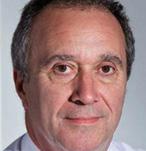 Member of The Difference Campaign Advisory Board and founder of the Mike Hammond Scholarship
Member of The Difference Campaign Advisory Board and founder of the Mike Hammond Scholarship
Cover Images (clockwise from top left) Prof Colin Cooper, UEA Chair of Cancer Genetics. The Bob Champion Research and Education Building.
Tsitsi
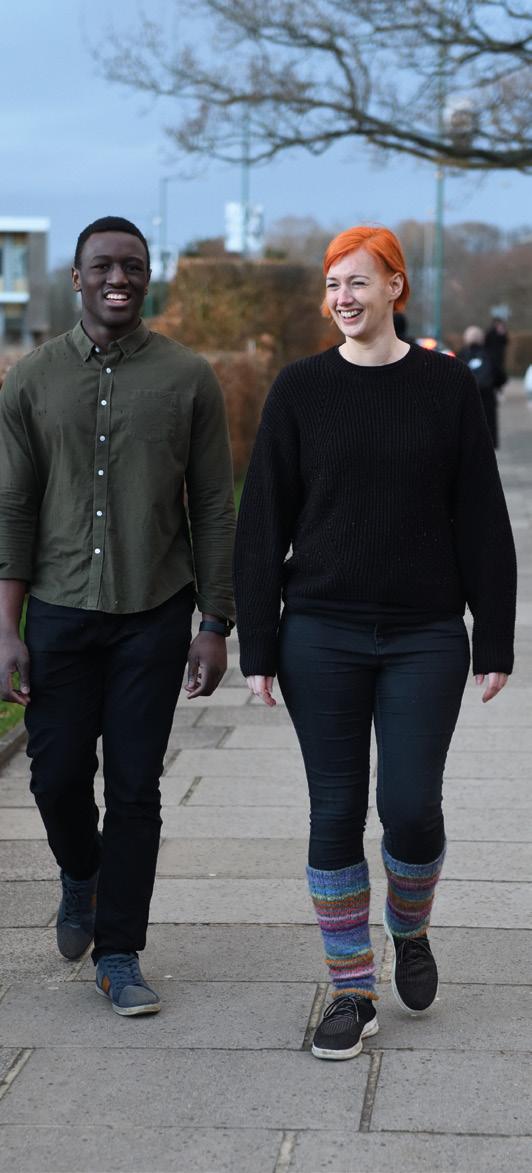
Literary circles at UEA were abuzz with excitement in late 2021, when Tsitsi Dangarembga made her first visit to campus following her appointment as International Chair of Creative Writing.
Our ambition is for the Zimbabwean novelist, playwright and filmmaker to be the first of five International Chairs. Her most recent novel, This Mournable Body, was nominated for the 2020 Booker Prize. In 2021, she received the PEN Award for Freedom of Expression and the Peace Prize of the German Book Trade.
In addition to hosting tutorials and workshops with UEA students, Tsitsi was the guest of honour at a reception in London. Here, we share an extract from the powerful speech she made on that night.
“My first home, that I remember, was a working-class house in Dover. There were no books in that home – or hardly any. Instead, I watched Dr Who and the Daleks and was rigid with fear. When I was six, we moved back to Umtali, now known as Mutare.
“But now I am here with you because of the power of books. That is a huge journey for a little Kentish girl to have made, don’t you think? I think this shows the power of books. The way literature can communicate different worlds and make leaps that maybe we cannot make in our everyday lives.
“Literature can help solve the most challenging problems we have in the world today. Issues that arise from misconceptions and misunderstandings between people all over the world. Often, we simply do not know enough about one another. But the great power of literature is to bring us together.
“When I first visited UEA as part of my role as International Chair, I hoped to reach students and have meaningful
conversations. As we discussed books, I was amazed to see these students’ bodies listening. Not just their ears – their whole bodies. At that moment, literature was helping to connect a diverse group of people who came from many different backgrounds.
“The Creative Writing programme at UEA is absolutely amazing. Before I was asked to be the first International Chair, I had read many of the University’s alumni. Those names I shan’t mention because I can’t possibly mention them all.
“I am excited and honoured to be the first International Chair at UEA, representing the region of Africa. Our ambitious programme of literary events, classes and workshops across Africa and the UK will champion global voices. We are supporting new writers in countries including Botswana, Kenya, Zimbabwe, Namibia and Uganda, as well as on the UEA campus through the first of the Global Voices scholarships.
“These scholarships open up ways for people to be their very best selves. That’s so important – both for the students and all of us. You see, I believe that when people become their best selves, then our countries become the best countries and our world becomes its very best world. On that note, I would like to say thank you very much.
“I am so grateful to the donors who have made it possible and our anonymous philanthropist. Your support has launched the ICCW programme, but more funding is required to keep up the momentum we have built in this first year. The potential here is enormous.
“I look forward to seeing what my fellow Chairs achieve in the regions of Asia, Australasia, the Americas and the Middle East after my time in the post comes to an end.
“Thank you so much.”

Alongside the International Chair of Creative Writing, our ambitious new scholarship programme aims to nurture the next generation of international talent. Ten scholars from the region of Africa will be selected, based on their outstanding creative writing potential and financial need.
This inaugural year has been fully funded by one generous philanthropist who has a passion for championing global voices and supporting emerging new writers. They have chosen to remain anonymous.
The hope is that a total of 50 Global Voices scholars will come to UEA alongside the International Chair programme. The next four regions are Asia, Australasia, the Americas and the Middle East – and fundraising urgently continues to make the remaining four years of the programme a reality.
Our first intake of Global Voices scholars includes Salma Yusuf, an MA Creative Writing (Poetry) student from Mombasa, Kenya.
Salma said, “I was brought up by a single mother who worked earnestly to make ends meet. Her tenacity and zeal always stirred something in me, and I knew I didn’t ever want to settle in life.
“The Global Voices scholarship will go a long way in helping me realise my full potential as a multilingual poet. This is an achievement not often in reach of a woman from the Swahili Coast. I have a vision of creating the first poetry hub in Mombasa to enhance the literacy levels of my people and broaden their perspectives.
“This year so far feels like a rebirth, the nurturing of a new seed. I want to say that I am so, so grateful for this life-changing journey.”
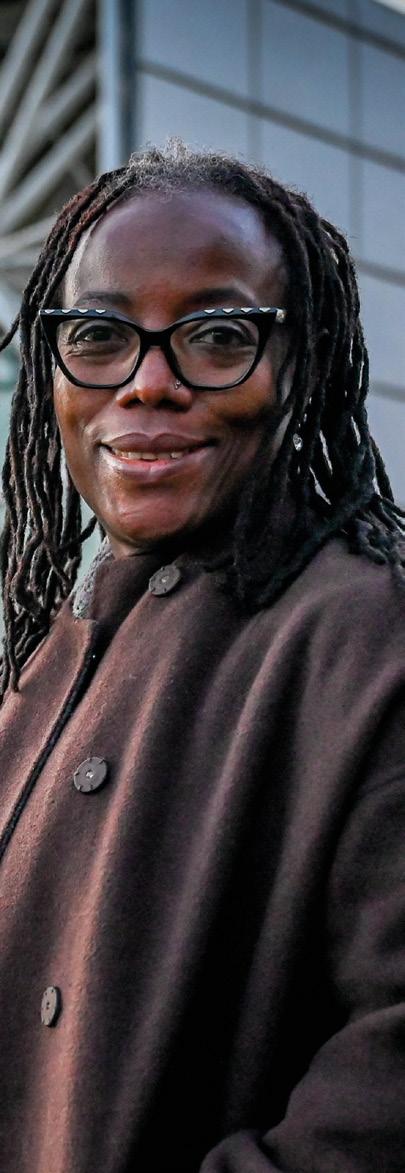 Tsitsi Dangarembga visited the UEA campus in late 2021.
A selection of books by UEA alumni on sale in the campus bookshop.
Tsitsi Dangarembga visited the UEA campus in late 2021.
A selection of books by UEA alumni on sale in the campus bookshop.
Almost 700 students. Holding hands, they could form a chain from one end of the campus’s famous Lasdun Teaching Wall to the other, and back again.
An impressive number. Yet this is how many students our philanthropists have brought to UEA across the life of The Difference Campaign, in subjects that encompass the full range of courses at the University. Thank you to everyone who has helped fund UEA scholarships and changed lives.
We know that scholarships will continue to be of vital importance at the University. In an unequal world, scholarships help the brightest and best earn their opportunities based on merit, not background.
Scholarships not only help students overcome financial barriers that could prevent them from accessing higher
education in the first place, but allow students to explore the full breadth of their potential whilst they are at UEA. The support they receive can give our students confidence in their abilities and talents. Many tell us they benefit greatly from having the time and resources to expand their world through societies, sports and friendships.
Our scholars will also go on to influence other lives through their work. Some even decide to fund their own scholarships, creating a ripple effect through generations. A gift to scholarships is one that could make an impact for many, many years to come.
Here, we look back at the achievements of some of the scholarship students who came to UEA in 2013 when The Difference Campaign began.
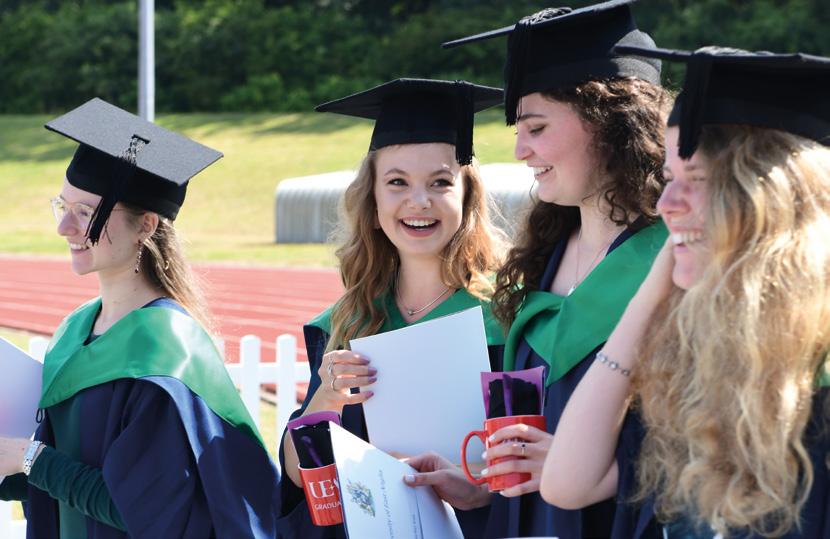
Thank you from this year’s
JACOB FRESHWATER (NBS13)
BSc (Hons) Accounting and Management
Mark V Williams Undergraduate Scholarship
Jacob is now the founder and managing director of Fresh Motors in Norfolk, an award-winning used car and commercial dealership established in 2015.
He said, “At UEA, I met and was surrounded with some truly remarkable individuals, with whom I hope to remain lifelong friends. The University will always have a special place in my heart.
“I feel honoured to have been able to represent Mark Williams as the recipient of my scholarship. When I first arrived at UEA, I felt like a humble sapling but I left having grown and flourished. Thank you, Mark, for allowing me this privilege.”
JAY ALDOUS (MED13)
MBBS MClinEd Clinical Education
Preparing for Medicine Scholarship
After foundation doctor training at West Suffolk Hospital, Jay started speciality training as a junior anaesthetist.


He said, “My graduation and journey through medical school are experiences I’ll never forget. I never thought I’d have so many letters after my name at the age of 24!
“David Tibble, who funded my scholarship, gave me the confidence to follow my dreams. Although medicine has been a challenging course to study, there is no doubt in my mind it was the right choice for me. One that may not have been a choice without David’s help. He has inspired me with his generosity, and I hope I too can one day support future generations of disadvantaged students.”
ANEALLA SAFDAR (LDC13)
MA Creative Writing (Prose Fiction)
Seth Donaldson Memorial Bursary
Anealla is now Europe Editor at the international news network Al Jazeera.
She said, “As I began my Master’s, I was able to meet Seth’s mother in Norwich. I thanked her and her friends for choosing to remember him with this incredibly generous gesture, which in my case made my degree possible. “That was the start of a supportive journey. At each step I felt encouraged by the new community of writers I was part of, professors and even the celebrated authors who regularly visited the faculty.”

I AM DELIGHTED AT MY UEA SCHOLARSHIP, AND DEEPLY GRATEFUL.
DennisMugaa, The Miles Morland Foundation African Writers’ Scholarship
MEDICAL TEXTBOOKS AND STETHOSCOPE WILL ALWAYS BE A REMINDER OF THE GENEROSITY THAT CHANGED MY LIFE.
Kassie King, Preparing for Medicine Scholarship
A SCHOLARSHIP IS ABOUT FAR MORE THAN A QUALIFICATION. I’M SO VERY GRATEFUL.
Rebecca Richards, The Norah Simpson Scholarship
scholars
We look back on the astounding difference that donors to The Difference Campaign have made to students’ lives.
Previously known as the Medical Aspirations Scholarships, medical students from East Anglia with backgrounds underrepresented in the profession have been supported from college through to graduation. We are deeply grateful to David Tibble (SOC70) for his support.
UEA’s prestigious creative writing programme is globally recognised. Our alumni have won or been shortlisted for every major literary award in the UK. Our generous philanthropists have given writers at UEA the time and space to develop their unique voices and go on to make their impact on world literature.
Santander Universities empower students in education, entrepreneurship and employability whose ambitions aren’t always matched by their means. Their longstanding dedication to higher education has brought 119 students to UEA during The Difference Campaign.
Funded entirely by generous alumni and friends of the University through monthly or annual gifts, 125 Difference Scholarships have been awarded during the campaign. 63 postgraduate and 62 undergraduate students were supported to fulfil their potential through university education.
Philanthropic giving brought students from countries worldwide to UEA during The Difference Campaign. This generosity enhanced UEA’s global identity and enriched our University community. In the past 12 months, students have arrived from Lebanon, India, Greece, Kenya, Nigeria, the USA and many more countries.
longside the individuals and organisations that can contribute large sums to work being performed at UEA, there is also a small army of the University’s alumni, staff and friends. Hundreds of supporters are pooling manageable monthly, annual and one-off gifts to significant effect – and we are extraordinarily grateful to each of you.
Dr Darrell Green’s work to provide life-saving new treatments for childhood bone cancer (see page 19) received generous support in response to emails and letters from UEA. The collective impact of smaller donations and new monthly donors was crucial to the project.
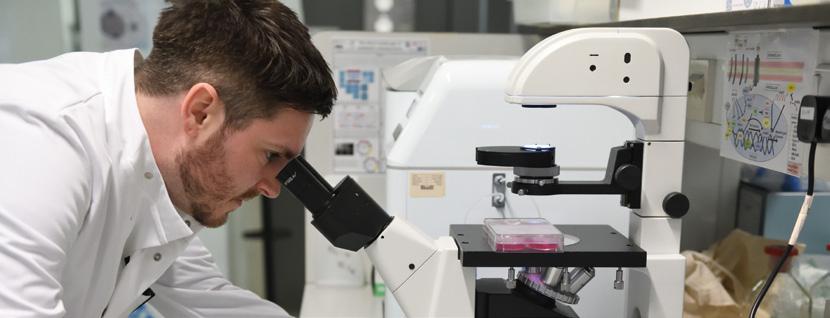
Many alumni and friends also chose to make additional gifts to support the Difference Scholarships, which are open to the brightest and best students in need of additional financial support. These generous donations will be enough to fund a postgraduate student’s tuition fees and support their living expenses during their time at University.
Throughout The Difference Campaign, thousands of supporters have chosen to give one-off amounts or start a monthly donation for work that inspires them. In addition to cancer research and scholarships, our student hardship funds have helped reach those in financial difficulties at
University. Other supporters have given to our ‘where the need is greatest’ fund that allows UEA to respond rapidly to challenges as they present themselves.
When generous people come together, donations of every size soon add up. As our attention turns to the future, your support will continue to be vital. Thank you very much for your kindness during The Difference Campaign.
£3m UEA Prostate Cancer Tests fundraising target
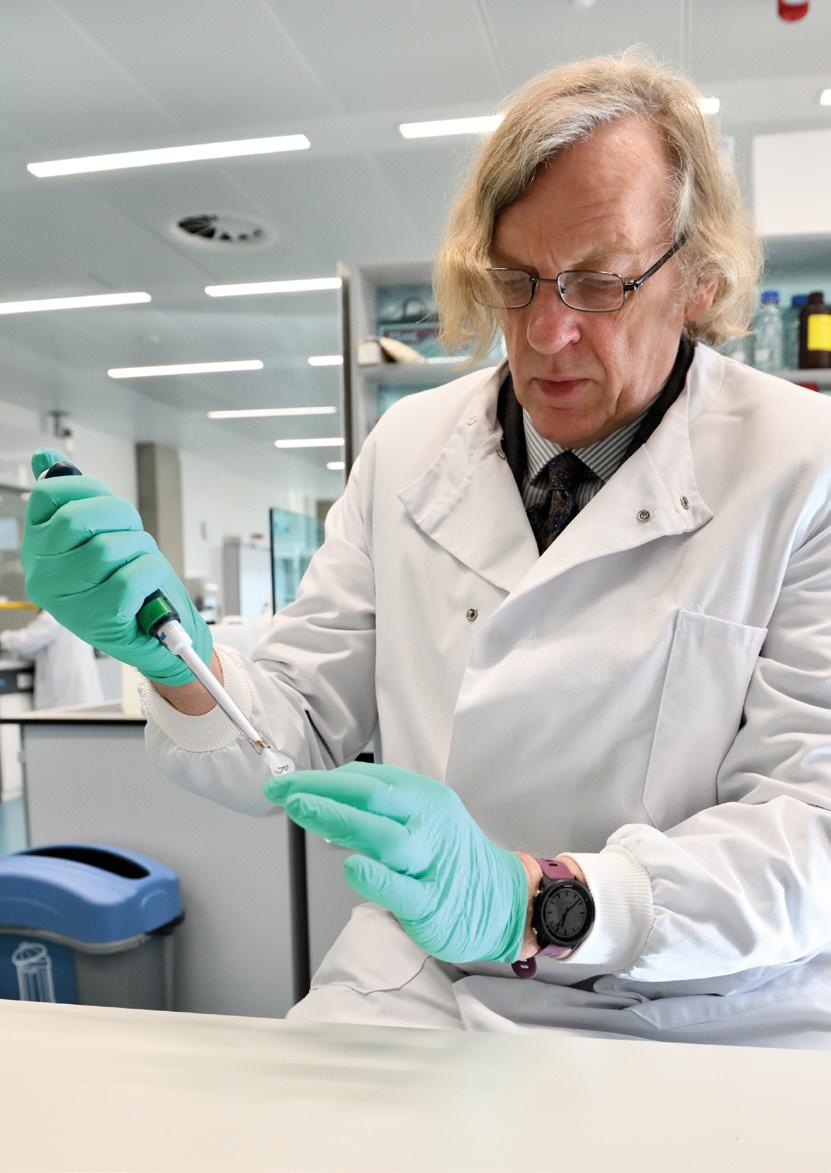 Prof Colin Cooper, UEA Chair of Cancer Genetics, leads the UEA Prostate Cancer Tests.
Prof Colin Cooper, UEA Chair of Cancer Genetics, leads the UEA Prostate Cancer Tests.
The UEA Prostate Cancer Tests, which continue their meticulous journey towards and through clinical trials, stand to transform the lives of millions of men worldwide.
However, the tests would still be just scientific observations and laboratory models were it not for the kindness, foresight and support of generous philanthropists at UEA.
One such individual was Andy Ripley (SOC66). This beloved British Lions rugby player made his experiences with prostate cancer public in his 2007 memoir, Ripley’s World. The book detailed his 2005 diagnosis and successful treatment, with all royalties donated to prostate cancer research.
After the disease returned and Andy’s subsequent treatment was unsuccessful,
there was an outpouring of support. His untimely death in June 2010, aged just 62, inspired a Memorial Fund. Their mission is to continue the work Andy was passionate about – transforming diagnosis and treatment for all men with prostate cancer.
Andy’s friends and family chose Professor Colin Cooper’s research at the University of East Anglia as the recipient of their support. At that time, the professor’s early research results showed promise of a new, less-disruptive test for the disease.
Andy had spoken fondly of his days at UEA as an undergraduate student and remained a popular face among his peer group of alumni.
The Andy Ripley Memorial Trust’s first action was to fund a postgraduate scholarship in UEA’s School of Biological Sciences to carry out research into the diagnosis, treatment u
u and prevention of prostate cancer. This early support provided a vital stepping stone on the path toward the Tiger Test, the first of UEA’s Prostate Cancer Tests.
Many types of prostate cancers cause very little harm but, until now, there has been no reliable way to distinguish them. The Tiger Test scrutinises prostate biopsy samples to predict accurately whether a patient has the most life-threatening and aggressive prostate cancers –nicknamed ‘tiger’ cancers.
In the past 12 months, the Tiger Test has received a considerable boost through a new diagnostic laboratory at UEA. A team of scientists and practitioners have been recruited to guide the test through clinical trials. This is the most significant remaining barrier standing before the Tiger Test’s adoption in hospitals worldwide.
Prof Cooper’s team, based at the Bob Champion Research and Education Building, have also made strides in developing a methodology that will allow the lab to use biopsy samples efficiently to gather robust and reliable results. This moves the Tiger Test closer to the clinic.
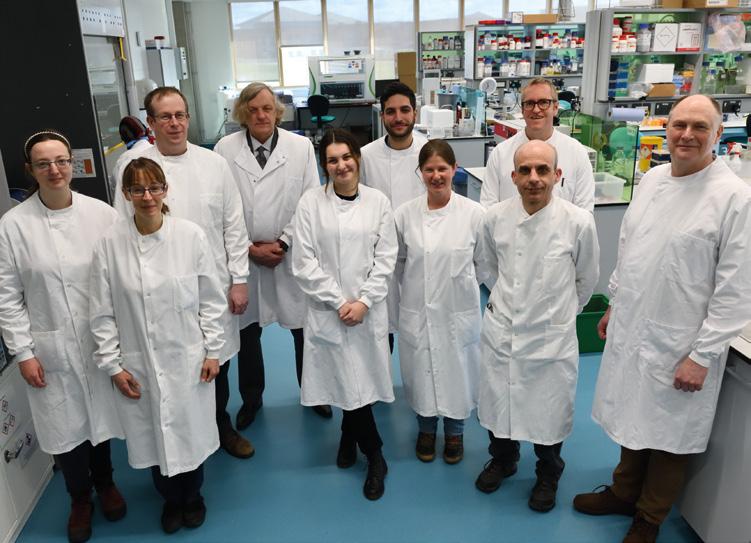
Finally, a direct pipeline has been established between the Norfolk and Norwich University Hospital and the UEA labs in the Bob Champion Research and Education Building.
This will provide the samples needed in coming years and improve test workflows ahead of the Tiger Test’s use in hospitals worldwide.
The diagnostic lab is also developing the Prostate Urine Risk (PUR) Test – the second of the two UEA Prostate Cancer Tests being developed.
The PUR Test uses urine samples to detect aggressive prostate cancer earlier with no need for an invasive biopsy.
In late 2021, the team at UEA announced an important development in the PUR Test. Not only is the test capable of detecting cancers not detected using a PSA blood test, but it can also reliably detect which cancers might become aggressive. This will reduce the need for men to endure uncomfortable examinations and provide reassurance for those on active surveillance.
Another exciting development is the progression of the PUR Test’s Prostate Screening Boxes, which allow men to provide a urine sample from their own homes. Over the past year, a trial in the UK, Europe and Canada proved successful, and patient feedback has been highly positive. There will soon be 17 sample collection sites worldwide.
The test is now being used by the team at UEA to validate the PUR signature in patient samples. This validation study will prove the process to be used by doctors and technicians to diagnose patients once the PUR Test has completed its clinical trials, making this data invaluable.
All of the remarkable progress made on the UEA Prostate Cancer Tests has only been possible thanks to the generous
Prof Colin Cooper
contributions from our philanthropic community. Alongside the Andy Ripley Memorial Trust, supporters of Professor Cooper’s research include the Bob Champion Cancer Trust, Big C, Prostate Cancer UK, Cancer Research UK, the Masonic Charitable Foundation, the Provincial Grand Lodge of Norfolk, the Hargrave Foundation, the Amar-Franses and Foster-Jenkins Trust, the King family, the Martin Wills Fund, the Paul Bassham Charitable Trust, the Alan Boswell Group, The R.C. Snelling Charitable Trust, the Norfolk Medical and Dental Education and Research Trust, Peter Saunders, and the Norfolk and Waveney Prostate Cancer Support Group.
During The Difference Campaign, this support has provided the building where the scientific discoveries underpinning the tests have been made – the Bob Champion Research and Education Building.
Donor support has also paid for postgraduate research positions, advanced scientific equipment and scanning technology, analysis of vast databanks using artificial intelligence, pilot studies in partnership with Norwich and Norfolk University Hospital, and much more.
It is no understatement to suggest that without this surge of support from those inspired by the incredible work happening at UEA, the team’s research might never have been translated into clinical use. Instead, they stand poised to spare millions of men the mental and physical burden of potentially life-altering but often unnecessary treatments. The UEA Prostate Cancer Tests will identify aggressive cancers sooner and allow clinicians to target patients with the most appropriate healthcare.
The support received during The Difference Campaign has already allowed the team at UEA to initiate clinical trials. However, more funding will be needed to complete clinical verification and accreditation. If the tests reach their fundraising goals, it is expected that the tests could be ready for use by patients within two to three years. The faster the tests are funded, the quicker that happens.
Thank you so much for your support during The Difference Campaign and into the future.
Founding the Andy Ripley Memorial Trust was a powerful way for the rugby star’s friends and family to remember him.
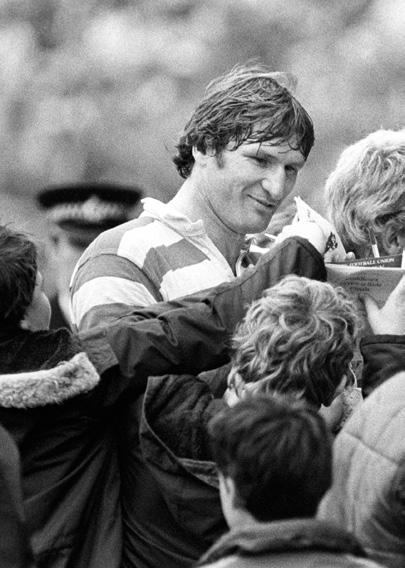
A gift to honour the life of a loved one can bring comfort at a time of loss and help memories live on.
Our deepest thanks go to all those whose gifts in memory have helped fund and further work across UEA.
Apart from prostate cancer research, gifts in memory have been used to fund scholarships and support future generations of students. Other donors have given to new campus developments that will be home to exciting learning and research in years to come.
Your gift will be received gratefully and recognised in a way that honours your loved one’s memory, according to your wishes.
If you would like to discuss leaving an in-memory gift, please contact the Development Office.
Andy Ripley, UEA alumnus and British Lions rugby legend.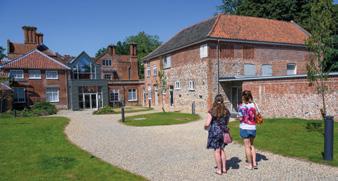
Thanks to philanthropic giving, the UEA campus and Norwich Research Park look very different from when The Difference Campaign began.
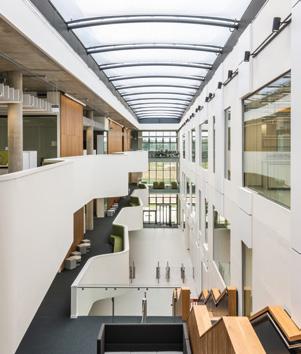
Alongside its scientific research, the Quadram Institute is the largest gastrointestinal endoscopy facility in the UK, treating 40,000 patients each year.

A £3 million state-of-the-art neuroimaging research centre to answer fundamental questions about how the human brain works.
Former courtyard buildings at the home of Elizabeth Fry have been transformed into vital teaching spaces and the UEA Law Clinic. Here, students work with local charities to provide legal assistance in the community.
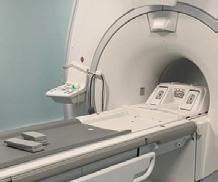 01 THE QUADRAM INSTITUTE
02 THE UEA WELLCOMEWOLFSON BRAIN IMAGING CENTRE
03 EARLHAM HALL
01 THE QUADRAM INSTITUTE
02 THE UEA WELLCOMEWOLFSON BRAIN IMAGING CENTRE
03 EARLHAM HALL
A new home for UEA’s 3,000 STEM students hoping to follow in the footsteps of Nobel Prize-winning alumni Prof Michael Houghton, Sir Paul Nurse and Dame Sarah Gilbert.
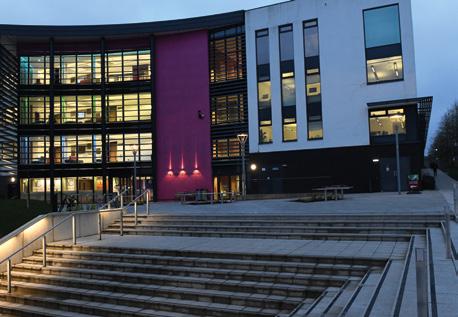
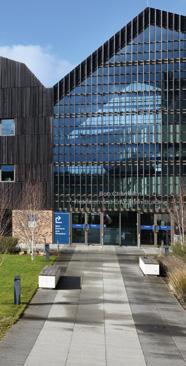
Campus development has been a vital part of The Difference Campaign, helping the University further cement its place on the international stage for education and research between 2013 and 2022.
UEA’s regional hub for future engineers features manufacturing laboratories, a computer-aided design studio and robotics facilities.
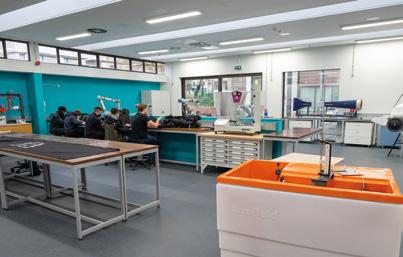
Our donor community have helped secure the past and future of the UEA campus. Historic buildings have been transformed, and the foundations have been laid for generations to come.
In fact, philanthropy has been at the heart of UEA since it was founded in 1963. Our most notable buildings have all been made possible thanks to visionary generosity.
Fundraising for campus development will continue to be of vital importance as the University continues to evolve. Philanthropic giving allows us to maintain our historically significant campus, whilst providing cuttingedge research and teaching facilities to compete at the highest level.
This £19 million medical research and teaching centre was named in honour of the Grand National-winning jockey, Bob Champion, following a donation by his charitable trust.
Our next capital fundraising project will see the iconic Lasdun Teaching Wall, which runs like a spine through the centre of campus, restored after more than 50 years of service. New spaces for learning will be created and the latest educational technology installed.
Thank you to everyone who has donated to fund buildings at the University of East Anglia and Norwich Research Park.
The Sainsbury Centre’s Chairman, Dominic Christian (SOC79), welcomes its new Director, Prof Jago Cooper.
Dominic Christian Hello, Jago. It’s great to introduce you to our readers. Could you tell us a little about yourself?
Jago Cooper My pleasure. I will be leading the Sainsbury Centre after a decade at the British Museum. I have long been an admirer of the Centre, and UEA more widely, because this is a place that responds to the changing cultural scene very quickly. It is nimble, engages with social issues and is proactive in advocating for why we have art and its importance to society.
DC Those sound very similar to the principles that UEA was founded on, and part of why Sir Robert and Lady Lisa Sainsbury chose our University as the home of their collection. You could say their gift broke many rules because they fused the design of a new building, a collection spanning disciplines and mediums, and investment in research to create great storytelling within the institution.
JC It was undoubtedly a comprehensive vision. The Sainsbury Centre’s impact in the years since proves that. My wish now is to continue to build on their philanthropic vision while responding to the world as it is today. I think the Sainsburys would feel very proud, and I know their family continues to be, too.
DC Could you talk about how philanthropy fits into your plans for the future?
JC Put simply, it’s at the heart of everything we do here. We want our exhibitions to be as inclusive as possible, so we do not seek to make a financial profit with them. Instead, we rely on the kindness and commitment of sponsors and donors, who generously shoulder that financial burden for the benefit of others. We feel our value to society is immeasurable. Still, the reality is we need support, and we are hugely thankful for it.
DC It was invigorating to see that sentiment come to life at the recent Rhythm and Geometry exhibition. I enjoyed
seeing pieces from the recent Morris legacy bequest to UEA alongside artworks from the Sainsbury Centre’s existing collection.
JC Joyce and Michael Morris were an extraordinary couple. She was a renowned educationalist and expert in phonics, while he was an art collector of great esteem. The 200 artworks they left to the University were a tremendous gift. Not just because we can now tell the stories of those artworks, but because of the dialogues they create across the collection. The Sainsbury Centre is now the most significant holder of British Constructivist art in the world. By coming here rather than being kept on their own and seen in isolation, we can weave together the threads of 20th-century art. Everyone here is so grateful to them both.
DC You joined the Sainsbury Centre towards the end of the global pandemic. Could you reflect on coming into your role during such a difficult time for the arts and the wider world?
JC There is no doubt that it’s been a tough time for the museum sector. But, by the same token, we have seen that as soon as people had the opportunity to get out again, museums and galleries were one of the first places they visited, reflecting how much they are valued by society. u
I THINK THE SAINSBURYS WOULD FEEL VERY PROUD .
Prof Jago Cooper
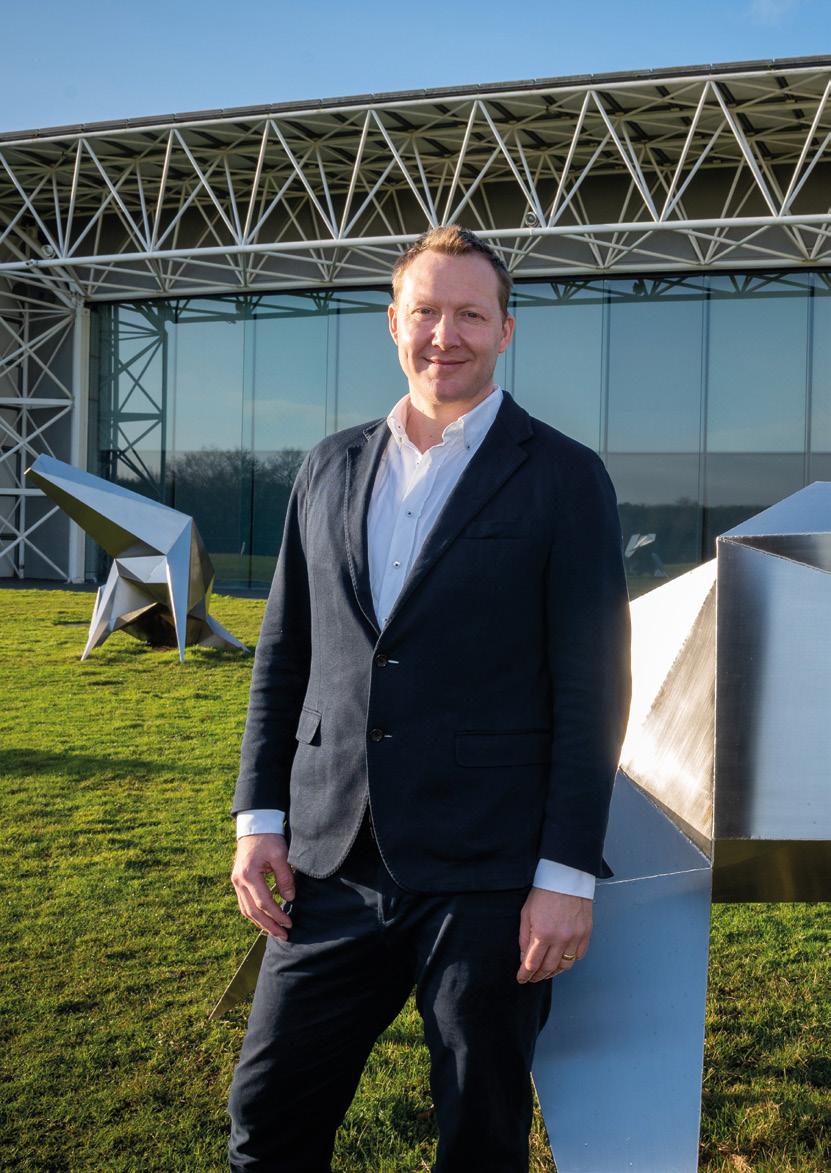 £600k
Sainsbury Centre fundraising target
Jago Cooper, Executive Director of the Sainsbury Centre and Professor of Art and Archaeology at UEA.
£600k
Sainsbury Centre fundraising target
Jago Cooper, Executive Director of the Sainsbury Centre and Professor of Art and Archaeology at UEA.
u DC It was a reminder that people have a fundamental need to open up their lives and fill themselves with thought and imagination.
JC Yes, and I think our recent funding from Arts Council England is a testament to just how influential culture is to us all. We received an incredibly generous grant of £325,000 to help repair the iconic glass facades of the Sainsbury Centre building. The project’s total cost will be over £600,000, so we continue to fundraise for the remaining amount. The work will help bring the astonishing splendour of the Foster-designed space back to life. Philanthropy, just as it has always been, is in the very fabric of the Centre.
DC A perfect note to end on. Thank you so much, Jago.
During The Difference Campaign, gifts in wills have funded a broad spectrum of work at UEA. In addition to Joyce and Michael Morris’ gift to the University (see overleaf), generous individuals have provided financial backing to student businesses through the Enterprise Fund, equipped scientific teaching labs with the latest equipment, funded pioneering prostate cancer research, brought students to UEA through scholarships and much more.
Dominic Christian (SOC79) Global Chairman of Aon Reinsurance Solutions, Co-Chairman, The Difference Campaign Advisory Board and Chairman, Sainsbury Centre Jago Cooper Executive Director, Sainsbury Centre and Professor of Art and Archaeology, UEA


Gifts in wills, also known as legacies, allow people of all backgrounds to make an enormous difference by supporting UEA’s work. For many, this is a meaningful and accessible way to continue a passion in life long after we are gone.
Thank you to everyone who has pledged a gift to UEA in their will.
If you are thinking of leaving a gift in your will to the University, please contact the Development Office for information and advice, free of expectation or obligation.
The Rhythm and Geometry exhibition at the Sainsbury Centre was made possible by philanthropy.During The Difference Campaign, the University of East Anglia’s international identity has shone brightly at SISJAC. The Institute, which we introduced readers to in 2021’s issue of Pioneer, has continued its important work despite the challenges for international travel presented by the COVID-19 pandemic. Each spring, nature-lovers across Japan flock to hanami parties. Enjoying drinks and snacks beneath blossoming cherry trees is one of the country’s most iconic traditions. So, in early 2022, SISJAC was delighted to receive a consignment of Japanese cherry trees, donated by organisations including the Embassy of Japan and the Japanese Chamber of Commerce and Industry.
The trees will be a powerful symbol of international connections. They will be planted in locations on the UEA campus and across Norwich, including outside SISJAC’s home in Cathedral Close and in public parks.
SISJAC also enjoyed a visit from the Japanese Ambassador to the UK, Hayashi Hajime, in early 2022. Ambassador Hayashi attended a workshop for 90 postgraduate students of Japanese studies from across the UK. The event was organised by the British Association for Japanese Studies and the Japan Foundation, as well as the Great Britain Sasakawa Foundation.
Thank you to everyone who has supported SISJAC during The Difference Campaign.
In many ways, UEA is like a machine. It is a complex system of moving parts, all expertly engineered and perfectly suited to their task. But how do the various parts know how to work effectively, without strategic direction from the top?
That has been the role of The Difference Campaign Advisory Board, formed to lead the University’s fundraising with skill and dexterity. Our board set the challenge of raising £100 million, and they have been instrumental in making it a success.
It is our great pleasure to use this opportunity to offer board members past and present our deepest thanks for their time and expertise over the years, which they have given freely and generously. We hope you will join us in offering them all a resounding ‘thank you’.
Dominic Christian and David Tibble Co-Chairs, The Difference Campaign Advisory Board£1m
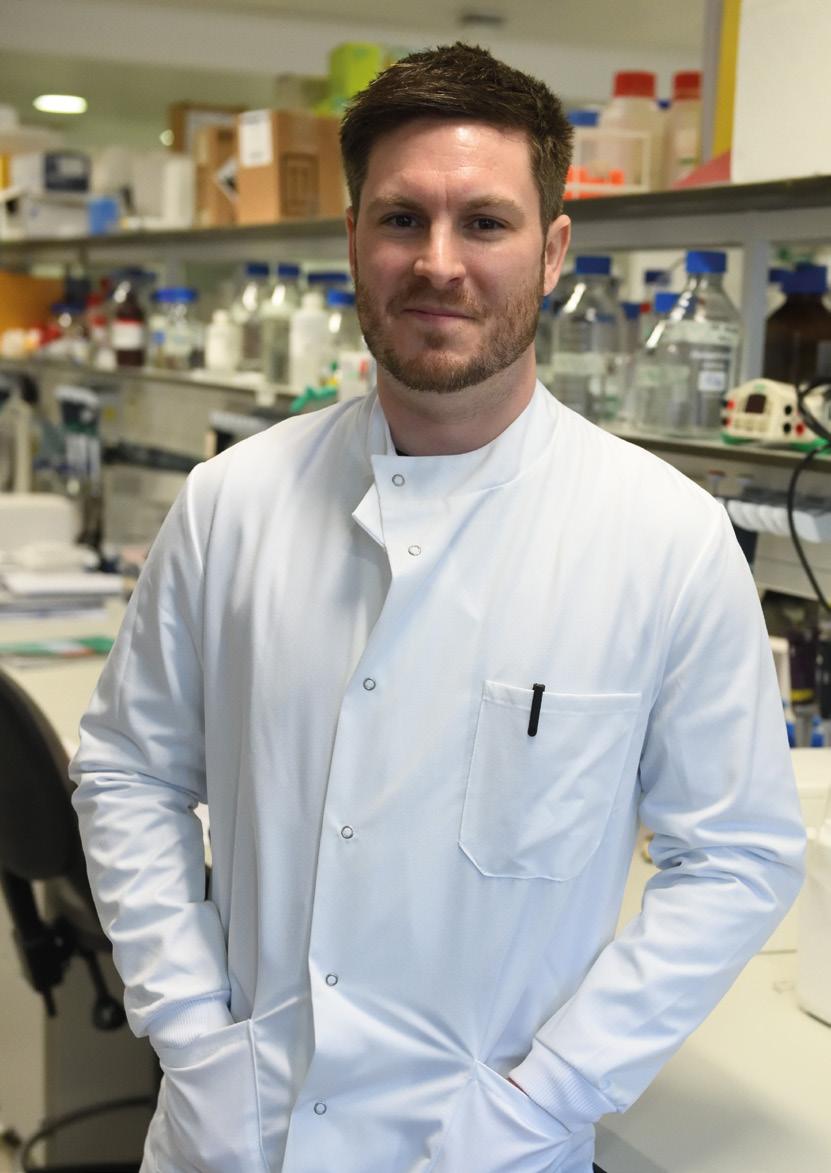 Childhood Bone Cancer fundraising target
Dr Darrell Green is driving the development at UEA of a new treatment for childhood bone cancer.
Childhood Bone Cancer fundraising target
Dr Darrell Green is driving the development at UEA of a new treatment for childhood bone cancer.
It has been the most significant breakthrough in the treatment of childhood bone cancer for more than 40 years. But Bensofib, UEA’s new marvel molecule that could double the survival rate of children with cancer with significantly less toxicity than chemotherapy, is reliant on philanthropy to become a medical reality.
Today, being diagnosed with bone cancer is a deeply frightening prospect for children. Just two in five will survive for five years. Many who do survive are left disabled due to amputations or the metal rods that replace affected bones. With the support of donors, we want to double the survival rate and avoid unnecessary treatments.
Dr Darrell Green (BIO06) is the scientist we introduced you to in the previous issue of Pioneer. He leads UEA’s childhood bone cancer research. His breakthrough discovery was made by isolating and analysing circulating tumour cells in patients’ blood. After a year spent searching for these one-in-a-billion cells, his team identified a potential gene responsible for the spread of cancer from one part of the body to another, a process known as metastasis.
“Babies develop in the womb thanks to specific embryonic genes that instruct cells to move around and make the baby, which become less active after birth as they are no longer needed,” explained Dr Green. “But we discovered that bone cancer cells reactivate these embryonic genes and pathways to achieve their goal of spreading to distant parts of the body.
“With support from donors, we pioneered an experiment that deactivated those genes in cancer cells. With our new molecule, tumours were less aggressive and stopped spreading to the lungs, representing extraordinary levels of potential as a treatment. We called the new molecule Bensofib.
“Our drug is named for Ben Morley, my childhood friend who died from bone cancer aged 13 and inspired my work; Sophie Taylor, a research participant who lost her life to bone cancer at five years old; Professor Bill Fraser, my academic mentor; and the gene inhibitor.
“It’s one thing being able to understand how or why cancer spreads at the molecular level, but it’s another to produce a new molecule or drug that can modify genetic processes in real time in a living being. That’s exactly what philanthropic support has allowed us to do.” u
There are two kinds of bone cancer that Bensofib is targeting. In 2020-21 pre-clinical trials, the new treatment led to the complete remission of Ewing sarcoma. In the second kind of cancer, osteosarcoma, the team saw a 50% increase in metastasis-free survival. And excitingly, there were no side effects.
The next stage for our researchers will be to subject Bensofib to extensive testing to make sure that it is safe to proceed with clinical trials. We will decide on a safe and effective dose for the new drug through toxicology studies. Following MHRA approval, clinical trials will begin, and Bensofib will start its first test phase in children with bone cancer to prove its effectiveness against treatments that are currently being used.
Alongside the main research focus on childhood bone cancer, Dr Green’s team has also seen Bensofib’s potential to treat other conditions.

“One of the genes we are studying is also involved in the spread of skin and lung cancer,” said Dr Green. “Our new drug also shows positive signs for preventing other cancers from spreading to the bones. There is just so much possibility here.”
There has been a historical lack of funding for childhood bone cancer. Just £147,462 was spent last year on research into the disease by the National Cancer Research Institute
and partners, including Cancer Research UK and the Medical Research Council. This is less than 0.02% of the total national UK cancer research budget of £669m. This is a year-on-year reduction of 25% and goes some way to explain why bone cancer standard care, chemotherapy and surgery haven’t changed since the 1970s.
Developing new drugs and treatments has become significantly more expensive since the mid-20th century. In recent years, drug breakthroughs have become more and more challenging to come by. A phenomenon known as ‘Eroom’s Law’, coined by industry consultant Jack Scannell, observes that the cost of developing new drugs doubles, in real terms, every nine years.
That is why Dr Green’s research is such an exciting opportunity. This is a chance to complete significant research into treatments for a disease that has received little attention up to this point. Meaning that donors could make a breath-taking impact in return for sums far lower than those contributed to better-known conditions.
We are privileged to have some of the foremost minds in research here at the University. With more than 300 researchers and £60 million worth of ongoing research, we are expanding the world’s understanding of ageing, cancers and cardiometabolic and gut health.
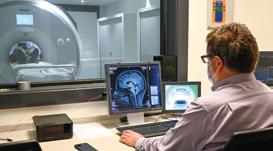
In the most recent Research Excellence Framework, 85% of our research output was rated as world-leading or internationally excellent.
The accomplishments of our researchers maintain the University’s standing as one of the top destinations for great minds – in the Times Higher Education World University Rankings 2022, UEA was rated in the World Top 200 universities and the World Top 50 for research citations.
A debt of gratitude is owed to the generous individuals who have allowed us to get to this position and those who will help us reach the finish line.
Without the extraordinary philanthropic support we have received, none of the significant progress made at UEA would have been possible. Children diagnosed with bone cancer would be no closer to new treatments that save lives and avoid debilitating amputations.
A donation today could result in fewer children losing their lives in years to come. Fewer families left with an irreparable hole in place of their son or daughter or struggling to support little ones left with a permanent disability. Could there be a more precious gift?
“Bone cancer remains one of the deadliest cancers and one of the most brutal to treat,” said Dr Green.
“The support from our donors places us on the verge of the first new treatment in more than 40 years. We are very grateful to everyone who has backed this transformative research. There is still lots of work needed to get over the finish line, so I also reach out to new donors. They will, quite literally, watch in real time the progress their generous donations will accomplish. Thank you all very much.”
UEA is rated in the World Top 50 for research citations. Our research outputs were rated as the 13th highest quality in the UK, demonstrating world-leading research excellence, particularly in the fields of health, climate science, biodiversity and conservation.
Our researchers are regularly named in the top 1% of the world’s most highly-cited researchers. The annual Highly Cited Researchers List identifies influential researchers who have demonstrated significant global influence by publishing multiple highly-cited papers in the past decade.
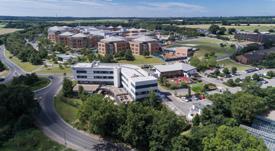
UEA is part of Norwich Research Park, home to a unique concentration of multidisciplinary expertise. This ensures we are well placed to carry out internationally influential research and contribute to the knowledge and understanding of global challenges.
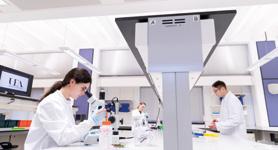
THE SUPPORT FROM OUR DONORS PLACES US ON THE VERGE OF THE FIRST NEW TREATMENT IN MORE THAN 40 YEARS.
Dr Darrell Green
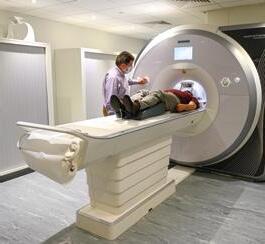
The generous support UEA receives from trusts and foundations becomes even more crucial during times of unexpected challenge, such as the recent COVID-19 pandemic. Thanks to trust and foundation funders, UEA students facing hardship were able to apply for emergency grants. As the University looked at how it could help to manufacture antibacterial handwash for the NHS or support the work of scientists producing COVID-19 diagnostic tests, trusts and foundations worked with us to make things happen.
We are eternally grateful to our trust and foundation supporters for their help during this challenging time and for continuing to support UEA’s work.
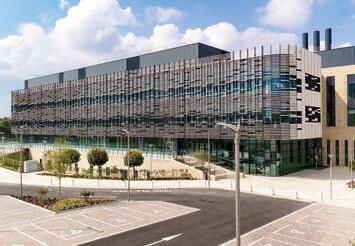
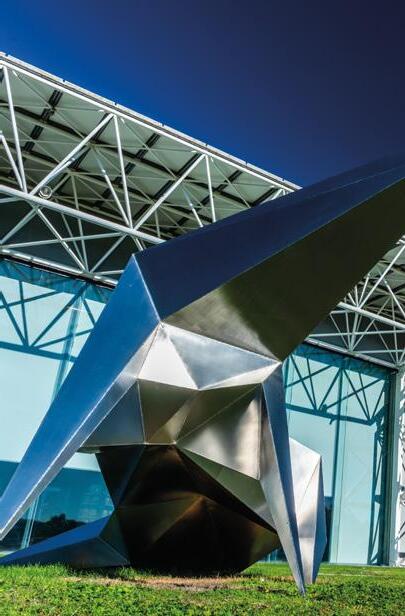
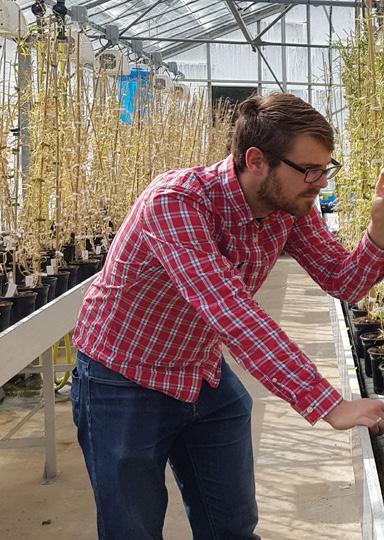
We would like to thank all the generous trusts and foundations that have supported The Difference Campaign. While we can’t mention them all, here are some highlights.
Founded by David Sainsbury, son of Sir Robert and Lady Lisa Sainsbury, Gatsby helped fund the construction of the Sainsbury Centre in 1978. The charitable trust continues to support the Sainsbury Centre’s pioneering arts and culture work in the UK.
Wellcome, the global charitable foundation, has funded many of UEA’s science schools and the Norwich School of Medicine. Recently, Wellcome also supported 12 Biomedical Vacation Research Studentships, providing bursaries for interdisciplinary study linked to biosciences and biomedical research.
A new cohort of 21st-century thought leaders is being created, thanks to the Leverhulme Trust. The Critical Decade for Climate Change Leverhulme Doctoral Scholars programme will train researchers to look at real-world data to help build the foundations for a healthy planet and fair society for the future.
Significant contributions to our understanding of the development of cognition have been made thanks to the generosity of the Bill & Melinda Gates Foundation, the secondlargest charitable foundation in the world. The foundation’s grant funds new assessment tools for large-scale, community-based interventions targeting working memory in infancy.
The John Innes Foundation has supported the development of Norwich Research Park,


the powerhouse of expertise in the life sciences. The foundation helped fund the Sainsbury Laboratory, which studies molecular plant-microbe interactions to tackle crop losses caused by existing and emerging plant diseases. And they supported the Norwich Institute for Sustainable Development, which fosters sustainable development through transdisciplinary research and innovation.
Finding effective solutions for those most in need is the aim of the Garfield Weston Foundation, which helped fund the Quadram Institute on Norwich Research Park. The institute studies gut health, microbiology and food to address global challenges. Garfield Weston also contributed to the multi-awardwinning Enterprise Centre, the home of business support at UEA.
The Panaspis Trust supports the Maria Bourboulis Scholarship in memory of UEA alumna Maria Bourboulis. To date, the scholarship has subsidised five Greek undergraduates who would otherwise have been unable to pursue university study.
The Wolfson Foundation supported the UEA Wellcome-Wolfson Brain Imaging Centre, an interdisciplinary centre for excellence in neuroimaging, and UEA’s Climatic Research Unit, a recognised world leader in the study of natural and anthropogenic climate change. The Bob Champion Education and Research Building, funded with the Bob Champion Cancer Trust, pursues medical discoveries.
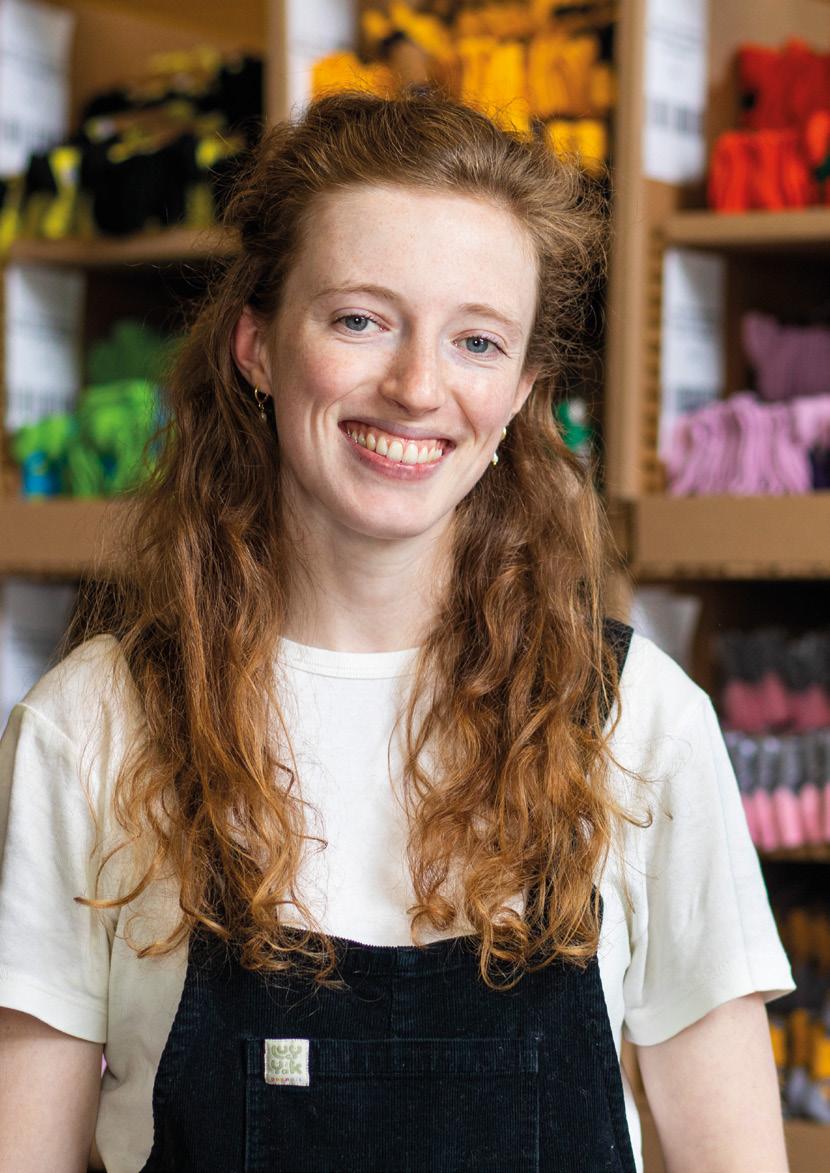 Lucy Jeffrey founded Bare Kind to save animals by selling socks.
£3m
UEA Enterprise Fund fundraising target
Lucy Jeffrey founded Bare Kind to save animals by selling socks.
£3m
UEA Enterprise Fund fundraising target

During The Difference Campaign, generous donors have supported more than 49 companies through the UEA Enterprise Fund, founded to give student and graduate entrepreneurs support to succeed in business.
Thank you to our generous donors for funding businesses over the past 12 months, including four companies that received ‘Grow It’ funding of up to £7,500.
A spinal cord injury nearly 20 years ago inspired Grippitz founder Dave Shraga (DEV11) to create a specialised new glove for wheelchair users with limited hand function.
The focus in the next year will be on reducing production costs by streamlining, gaining professional insight and relaunching Grippitz after the completion of a branding and website refresh.
A podcast production company specialising in darkly comic audio fiction. Its flagship series, Mockery Manor, was nominated for Best Fiction at the British Podcast Awards 2020.
The Grow It award will support Long Cat Media’s next ambitious project, the musical series The Ballad of Anne and Mary.
This sustainable e-commerce platform connects consumers to ethical companies and their eco-friendly products. The Greenr platform will be offered as a realistic alternative to mainstream online retailers like Amazon or Argos, making it viable for the everyday consumer to shop more sustainably.
The ‘Grow It’ award will be used for platform development and marketing.
A 20-minute swim is the equivalent of two hours of walking for a dog. This swimming pool for dogs offers somewhere safe and warm for our four-legged friends to get their exercise.
Backing from the Enterprise Fund will allow Doggy Paddle to expand its successful leisure sessions and diversify with a hydrotherapy service. The ambition is to build the business into a franchise model.
Bare Kind, the ethical sock company led by UEA alumna Lucy Jeffrey (BIO13), received ‘Scale It’ funding worth £50,000 from the UEA Enterprise Fund this year.
Lucy said, “Bare Kind was created to save animals by selling socks. Through the sales of high-quality products that customers love, my company donates profits to animal conservation and rescue charities.
“Our headline product is Bare Kind bamboo socks, where 10% of the profits are donated to the animal on the sock. Our range includes orangutans, turtles, penguins, bumblebees, Amur leopards and more.
“I initially applied for and received a ‘Grow It’ award of £7,500. But it wasn’t long before I was ready to take my company to the next stage and was successful in applying for the Enterprise Fund’s ‘Scale It’ award worth £50,000.
“The funding supported Bare Kind’s marketing efforts over Christmas and the New Year, and will fund our continued growth as we launch new sock designs and expand sales in Europe, the US and Australia.”
ctions have consequences. Collectively, the actions of our species have set in motion a chain of events that will do untold damage. Changing conditions will make landscapes inhospitable and ways of life unrecognisable. Extreme weather patterns will become more common. The world will struggle with the challenges of desertification, sea-level rise and species loss. Our global ecosystem will tilt until it collapses.
Unless, that is, we can take decisive, positive action before it is too late. We must limit global temperature rises to 2°C before the critical decade is out.
Our philanthropic community is gathering behind UEA’s practical manifesto to tackle our climate emergency. This four-point plan will provide world-leading scientific leadership that equips governments, organisations and individuals with the tools we need to make a difference.
The 2020s must be our decade of action. This is the first decade in which the disastrous effects of climate change are becoming visible to the naked eye and the last in which we can act to reverse it.
UEA is ideally placed to deliver on this ambitious plan. Our University established the UK’s first climatic research unit nearly 50 years ago. We have made the most substantial and sustained contribution of any university to the evidence
base of the United Nations’ Intergovernmental Panel on Climate Change (IPCC).
UEA will establish an Observatory for Climate Recovery to gather verifiable data about climate change and determine what must be done. Building on the existing expertise in the UEA Tyndall Centre, we will look at ways that human behaviour can be adapted where possible and its impact mitigated where not.
The world needs objective evidence on rainfall, temperature change, carbon emission levels and air composition. We will exploit the modern-day explosion of data – whether from container ships, submarine exploration, satellites or the phones in our pockets.
UEA teams are already talking to Google about using their extraordinary quantity and history of GPS data to understand how forest fires start and spread. We’re partnering with the authorities in cities like Milan to examine precisely what happens to emissions after a transport policy shift from motor vehicles to walking and cycling.
Weather patterns and natural disasters that were previously once-in-a-generation events are now occurring with chilling regularity. To plan for potential crises, authorities will need u
Your support is helping to support climate action in the critical decade.

u access to peer-reviewed evidence and the latest science base.
Our vision is for ScienceBrief to become an ambitious, comprehensive platform led by an outstanding team of researchers, analysts, science communicators and technicians to translate data for politicians, businesses and individuals in charge of public action and policy. Whenever there is a hurricane, drought, forest fire, flood or climate-related health emergency, this new platform will be the cited authority on the science of change.
The ScienceBrief team is led by Professor Corinne Le Quéré CBE, who was awarded the Heineken Prize for Environmental Sciences for her research.
The risk of climate change to global ecosystems is well documented. But what if environmental protections for at-risk species and landscapes could also be used to help in the fight against climate change?
The joined-up thinking necessary for naturebased climate solutions is only possible through coordination and collaboration. This is the task of the new Research Centre for Ecosystems and Climate Sustainability.

Our team will work to better understand the specific pressures that ecosystems face, before developing solutions in partnership with organisations across the world.
For example, our marine environment has been subjected to a poisonous cocktail of acidification, temperature rise, overfishing and plastic pollution. As water covers around 70% of the planet, and oceans play an important role in absorbing carbon, investing in their health has enormous potential. UEA is already working with colleagues at the UK Government’s Centre for Environment, Fisheries and Aquaculture Science to better model the increasing instability of our seas. We are also studying natural sea defences such as sand dunes and marshes in place of solutions like concrete walls.
On land, our future will depend on the health of the rainforests. Led by Professor Carlos Peres, a winner of Time Magazine’s Environmentalist Leader for the New Millennium Award, we are researching how the ability of rainforests to act as a carbon sink is being threatened. The sooner that funding for this new Research Centre is provided, the sooner we can influence policymakers, avoid catastrophic damage and, crucially, begin to reverse our losses.
Left ScienceBrief will become a comprehensive platform to share peer-reviewed evidence and the latest science base on climate change, including sea level rise.
Right
The Research Centre for Ecosystems and Climate Sustainability studies the specific pressures that ecosystems face.
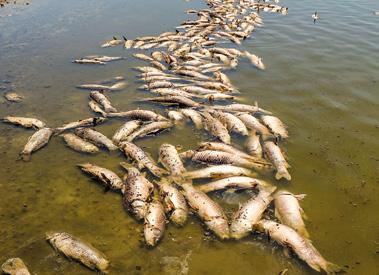
Finally, and in some ways, most importantly, we’ll focus on the place where climate change is manifesting most dramatically – in the UEA Polar Initiative. Summer sea-ice cover has shrunk by more than half in the past 40 years. Climate models predict the remaining half could be gone in the next 30 unless carbon emissions are rapidly reduced. Melting sea ice exposes dark ocean surfaces that absorb rather than reflect sunlight, accelerating warming in the polar regions.
Sea ice also lies at the interface between the ocean and the atmosphere. As well as providing a unique habitat for a variety of microorganisms, sea ice modifies the Earth’s energy balance, surface water properties and gas exchange processes. Understanding these processes is key to the polar climate.
The Roland von Glasow Air-Sea-Ice Chamber is a specialist sea ice laboratory built on the UEA campus to replicate conditions in polar regions. We will study how ice forms and melts, the life of microbes under the surface and the interaction of melting ice and snow particles with ozone and halocarbons. This will allow us to understand the role of sea ice loss in driving climate change and help us conserve these specialised ecosystems.
UEA is also sending autonomous vehicles to the inhospitable Thwaite’s Glacier in West Antarctica, which is on the brink of collapse, to study ice loss mechanisms. By learning more about temperatures and salinity under the glacier, we will provide vital information about its potential to cause a portent rise in sea level.

We all need to play our part. Scientists. Policymakers. Technicians. Engineers. Lawyers. Environmentalists. Writers. Politicians. Journalists. Business leaders. The public. And philanthropists. At UEA, we will all come together from different fields to innovate, collaborate and make a difference.
With the right support and a practical agenda, change is possible. Our supporters are helping our teams analyse data, inform policymakers and educate the public to decarbonise our planet. A limit in global temperature rise to 2°C, widely seen as the threshold we should not cross, remains achievable in the critical decade.
Our work will address pressing and future challenges and end climate inaction once and for all.
Thank you to the generous philanthropists who have already supported climate change research at UEA.
WITH THE RIGHT SUPPORT AND A PRACTICAL AGENDA, CHANGE IS POSSIBLE.
In 2019, UEA received a wonderfully generous gift to the Pioneer Fund in the will of our late alumnus Neil Pettifer (EUR75). Neil was a dedicated and active member of UEA’s alumni community and organised regular UEA reunions in Spain, where he lived and owned his own property business. Neil’s love of his time at the University and the community he was a part of lives on through his legacy gift. Investing his donation in the Pioneer Fund means his generosity will generate returns that make a difference for many years to come.
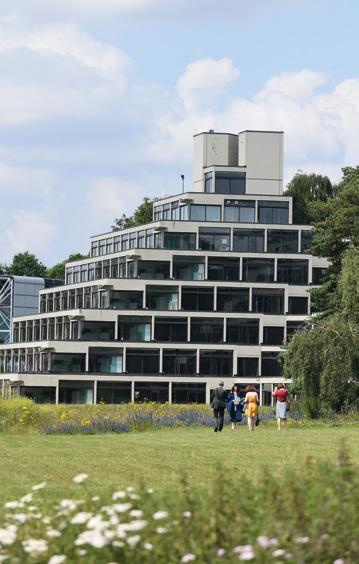
The interest generated on Neil’s gift will be used wherever the need is greatest. However, donors can also choose to support a specific area or goal, such as scholarships or research. If you would like to discuss a gift to the Pioneer Fund, please contact the Development Office using the contact details on the back cover.
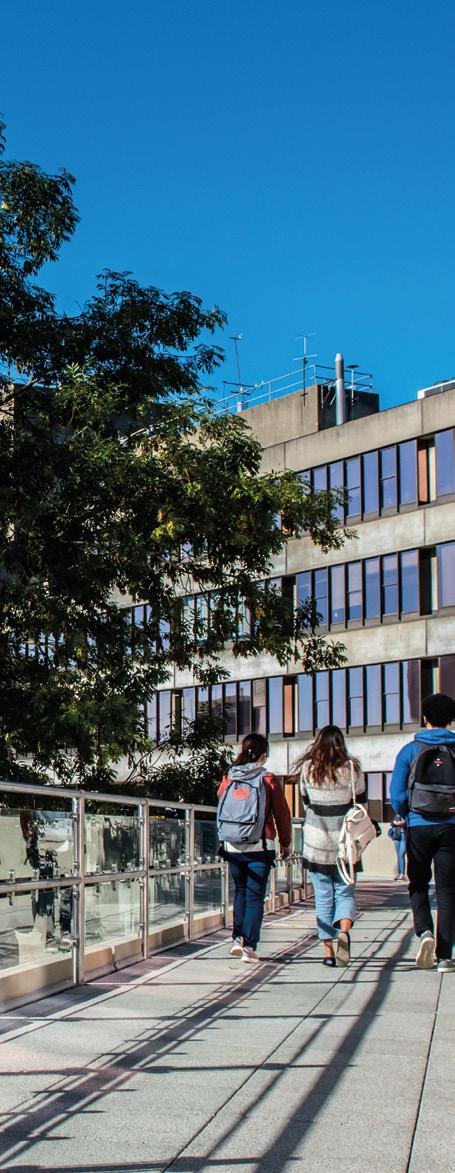
In the previous issue of Pioneer, you may have read that the hope was to double the Pioneer Fund value by its second birthday. I’m delighted to say that this ambition has already been exceeded. Our new endowment fund, launched with a generous leading gift from alumnus David Kowitz (EAS83), has grown thanks to additional donations and has quickly reached the impressive sum of £2.3 million in just a single year.

“The past 12 months have been an establishment phase for the Pioneer Fund. Our investment advisors have begun carefully managing the money. We’re excited to start seeing returns in the coming months and years.
“Next year, we celebrate 60 years since UEA was founded. This tremendous milestone reminds me that while it has taken us this long to establish an endowment, there is much potential awaiting us for the next 60 years. We are leaving a lasting philanthropic fund to support the future of the University.
“I would encourage any philanthropist interested in our pioneering research, teaching and scholarships to consider donating through
the Pioneer Fund. It’s a simple yet effective way to multiply your impact and build the University’s resilience against evolving challenges and those yet to be identified.
“The Pioneer Fund will help us weather storms and maintain the pace of our significant advancements, even during difficult times. The past couple of years has shown us just how crucial financial resilience will be in years to come.
“Alongside UK donors and our generous alumni, my colleagues in the Development Office are in conversation with our worldwide community of philanthropists about the Pioneer Fund. UEA’s global credentials mean that we are attracting support from all over the globe, and I am delighted we are now able to welcome international giving to our endowment fund.
“My thanks to everyone who has given to the Pioneer Fund. I look forward to welcoming many more to the endowment in the coming months and years.”
Professor David Richardson Vice-Chancellor and President, University of East AngliaUEA’s Pioneer Fund got off to a confident start and is worth £2.3 million after just one year.
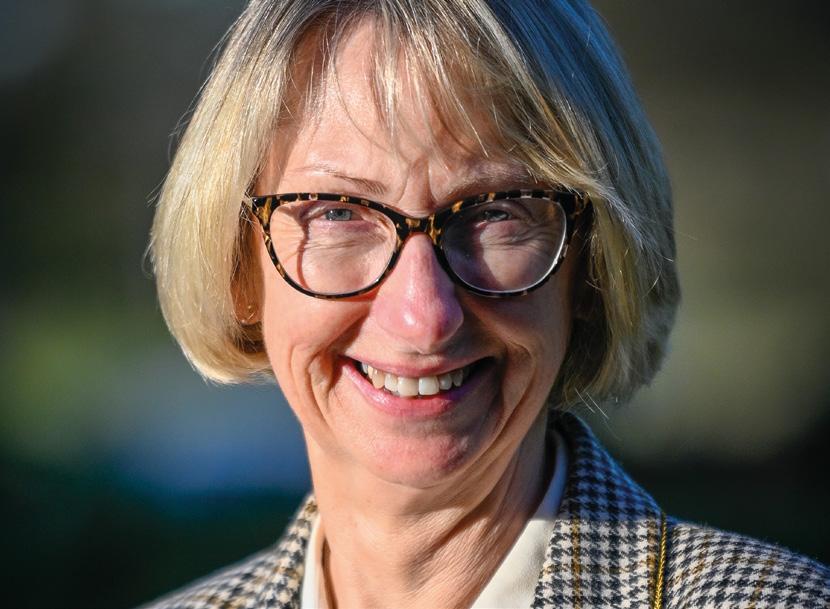
Ijoined UEA as The Difference Campaign was nearing its target. This enormous fundraising effort has blown me away.
I have worked in the aerospace industry and know firsthand what passion and collaboration can achieve. UEA has many pioneers of its own. Not just its students, world-leading scientists, researchers and educators, but also its supporters.
The Difference Campaign, and all it has achieved, was only made possible
because of generous people coming together to make a difference. Those who fund the work, those who will undertake it, and those who benefit from it.
You have been a vital part of that. Your name is now part of the story of UEA. And your accomplishment comes just as we prepare to celebrate the 60th year of the University.
As the ink dries on The Difference Campaign’s final accounts, we are
already looking to the future. To the next global challenges that we will solve, the next great fundraising effort. Exciting times lie ahead for UEA’s philanthropic community. But for now, we toast this successful chapter in our story.
To you, our loyal supporters. Thank you so much.
Dr Sally Howes OBE Chair, University of East Anglia Dr Sally Howes OBE, UEA Chair of Council.YOUR GENEROSITY INSPIRES US ALL. TOGETHER, WE HAVE ACHIEVED SO MUCH.
Karen Jones (EAS75) Chancellor of the University of East AngliaI FEEL VERY FORTUNATE TO BE RECEIVING THE SUPPORT OF THOSE WHOSE PASSION IS TO HELP ME EXPLORE MY OWN.
Jack Howard Recipient of the Victor Thomas Penfold Scholarship 2021THANK YOU FROM THE DEVELOPMENT OFFICE AND ALL OF UEA’S ACADEMIC STAFF AND STUDENTS.
David Ellis (NBS09) Director of DevelopmentUEA’s philanthropic community enables the University to create pioneering change in the world.
We are harnessing the power of philanthropy to fund and further the University’s groundbreaking work, adding global reach and impact. Together, we tackle the world’s greatest challenges and transform lives.
The funding you provide is put to work on visionary research, education, campus development, student support and much more. Thank you for helping to make a difference.
If you would like to get involved, please donate online at www.uea.ac.uk/difference
Or, to discuss your gift, please get in touch with the Development Office.
Telephone: +44 (0)1603 592 945
Email: giving@uea.ac.uk
Development Office
University of East Anglia
Norwich Research Park
Norwich
NR4 7TJ